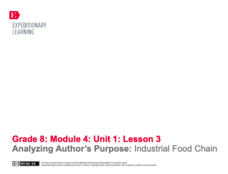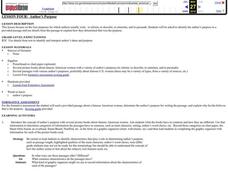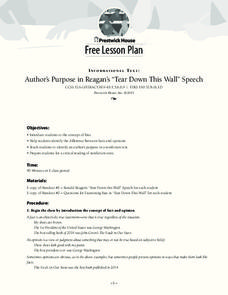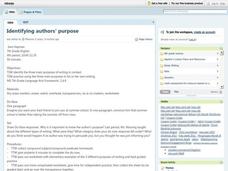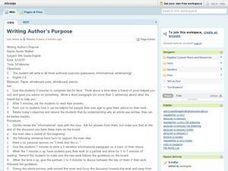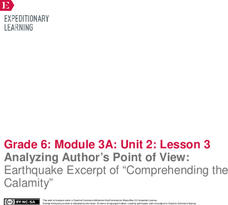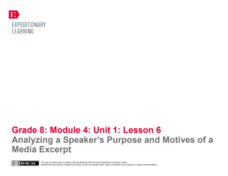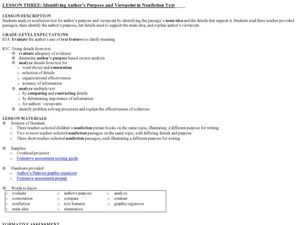EngageNY
Analyzing Author’s Purpose: Industrial Food Chain
Using an Author’s Purpose anchor chart, groups examine a variety of text to determine the author's purpose. They then apply what they have learned to The Omnivore’s Dilemma. In pairs, they discuss what the text is about and why it was...
Curated OER
Lesson 3: Distinguishing the Author's Purpose
It is true that the more you practice something, the better you'll get at doing it. Lesson three in a three part series on author's purpose has kids venture out to determine the author's purpose in three different passages. They'll read...
EngageNY
Reading for Gist, Answering Text-Dependent Questions, and Determining Author’s Purpose: Industrial Organic Food Chain
After re-reading The Omnivore’s Dilemma using a Reading Closely: Guiding Questions handout, class members use sticky notes to annotate and determine the gist of the text. Finally, they use an Author’s Purpose graphic organizer to...
Curated OER
Author's Purpose
Readers identify the author's purpose. First, they read a passage and utilize details from the piece to determine the author's purpose. Then they will explain how they arrived at their conclusion. Links to materials are provided.
Curated OER
Determining Author's Point of View: The Sneeches
Determine the author's point of view in a text. Young readers read Dr. Seuss' The Sneeches and identify the author's purpose in the story. They identify persuasive techniques in writing, asking and answering questions to better...
Curated OER
What's the Author's Purpose?
What is the author's purpose for sharing an autobiography? Start this lesson with the short story provided about getting pulled over by a police officer. Then, discuss the acronym PIES and how it stands for the four main reasons an...
Curated OER
Author's Purpose: Research Process/Narrative Writing Techniques
Determine the author's purpose in writing a memoir. Eighth graders work in groups to elicit author's purpose in memoirs, taking care to note how subtle the message can be hidden throughout the work. This instructional activity is a good...
Maryland Department of Education
The Concept of Diversity in World Literature Lesson 12: Author's Purpose - Yeats and Achebe
Is there such a thing as fate/luck? Can one fight destiny? As part of their study of Chinua Achebe's purpose in writing Things Fall Apart, class members answer these questions from Achebe's point of view and then from William Butler...
Prestwick House
Author’s Purpose in Reagan’s “Tear Down This Wall” Speech
President Ronald Reagan's "Tear Down This Wall" speech, delivered on June 12, 1987 before the Berlin Wall, provides class members with an opportunity to examine three key aspects of informational text: author bias, the use of facts and...
Maryland Department of Education
The Concept of Diversity in World Literature Lesson 10: Author's Purpose Seminar
Why did Chinua Achebe write "An Image of Africa: Racism in Conrad's Heart of Darkness" in response to Conrad's novel? As part of a study of Things Fall Apart, class members conduct a socratic seminar focused on Achebe's purpose and...
Curated OER
Author's Purpose
Sixth graders brainstorm the reasons authors write, and they list their responses on the board. Students discuss each purpose they have listed.Students work independently to read the selection "Tarantulas and Typhoid" by Stephanie Moss....
Curated OER
Identifying author's purpose
Why is it important to know an author's purpose? After reviewing the three main purposes of writing, seventh graders write a persuasive letter to convince why summer school is better than taking the summer off. They can then join in a...
Curated OER
Author's Purpose
A simple activity for young readers, this introduces the idea of author purpose. Learners analyze various types of texts (newspaper articles, magazines, books, advertisements, etc.) and determine if the author's purpose for writing was...
Curated OER
Identify and Discuss the Author's Purpose
Examine author's purpose in a persuasive text using this scaffolded plan. You essentially have a verbatim script here, but it can definitely be used as an outline instead. Review questions that readers should ask themselves when...
Curated OER
Author's Purpose
How do you determine an author’s purpose? You ask the author, of course. Invite a local journalist into the class to respond to scripted student questions about his/her writing process. A review of basic classroom etiquette is also...
Curated OER
Writing Author's Purpose
Write in all three authorial purposes (persuasive, informational, entertaining) with this instructional activity. Young writers consider a time when a friend of theirs helped them out and gave them advice on something. They write a short...
EngageNY
Reading for Gist, Answering Text-Dependent Questions, and Determining Author’s Purpose: Industrial Food Chain
A Reading Closely: Guiding Questions handout leads readers to discover the gist of The Omnivore’s Dilemma. While reading, pupils look closely at the words in the text and discuss their meaning. They use dictionaries when needed to answer...
EngageNY
Mid-Unit Assessment: Analyzing Author’s Purpose in Speech and Text
Part one of a mid-unit assessment relating to The Omnivore’s Dilemma includes listening to and analyzing a speech by Birke Baehr. Part two involves analyzing an excerpt from the text. The assessment ends with short response questions.
Curated OER
Hermeneutics: Teaching Students Author's Purpose
Your developing literary critics discuss 'perspective' and discuss how the same occurence can be interpreted by two different people in two different ways. They read Ryszard Kapuscinski's untitled poem, infer meaning of the poem, and...
EngageNY
Analyzing Author’s Point of View: Earthquake Excerpt of “Comprehending the Calamity”
How do authors convey their points of view? Using the resource, scholars read an excerpt from a primary source document about the 1906 San Francisco earthquake. Then, they complete graphic organizers to analyze the author's point of view.
EngageNY
Analyzing a Speaker’s Purpose and Motives of a Media Excerpt
Middle schoolers listen to a media clip of a teacher-selected speech and analyze it for speaker's purpose using a Speaker’s Purpose graphic organizer. Pupils pair up to discuss their completed organizers and add any new information they...
Curated OER
Identifying Author’s Purpose and Viewpoint in Nonfiction Text
Why do people write books? Pupils discover how to identify the author's viewpoint. They read non-fiction passages their instructor selects (the plan has the class look at nonfiction children's picture books), and then identify the...
Curated OER
Using Details from Text to Identify Author's Purpose
Explore writing techniques by analyzing newspapers and magazines with middle schoolers. They will collaborate in small groups to read local news stories and identify the main ideas and author's intent. They also utilize an information...
Curated OER
Reading-Author's Purpose
Students review what author's purpose is by understanding that authors either persuade, inform, describe, or entertain with their story. In this language arts lesson, students bring in junk mail and in small groups discuss what the each...


